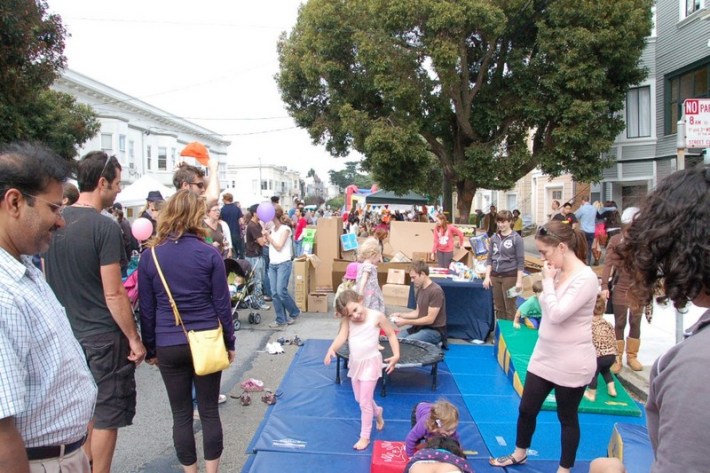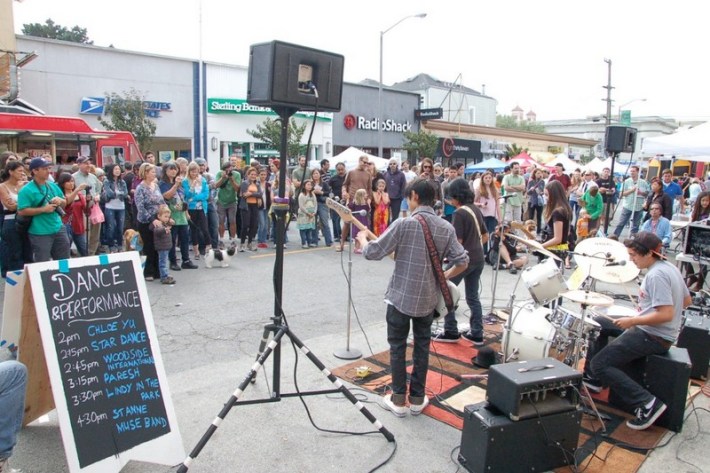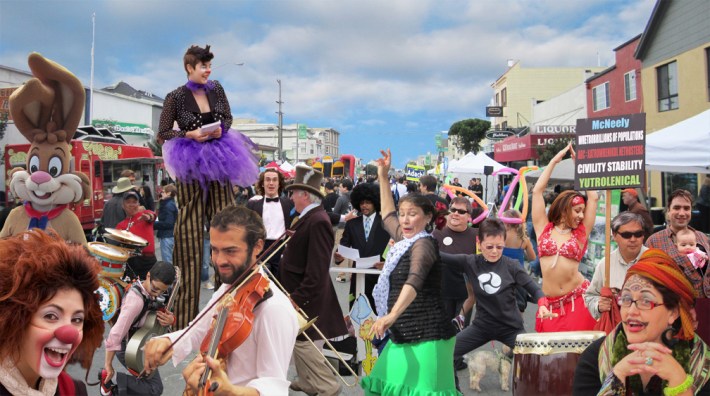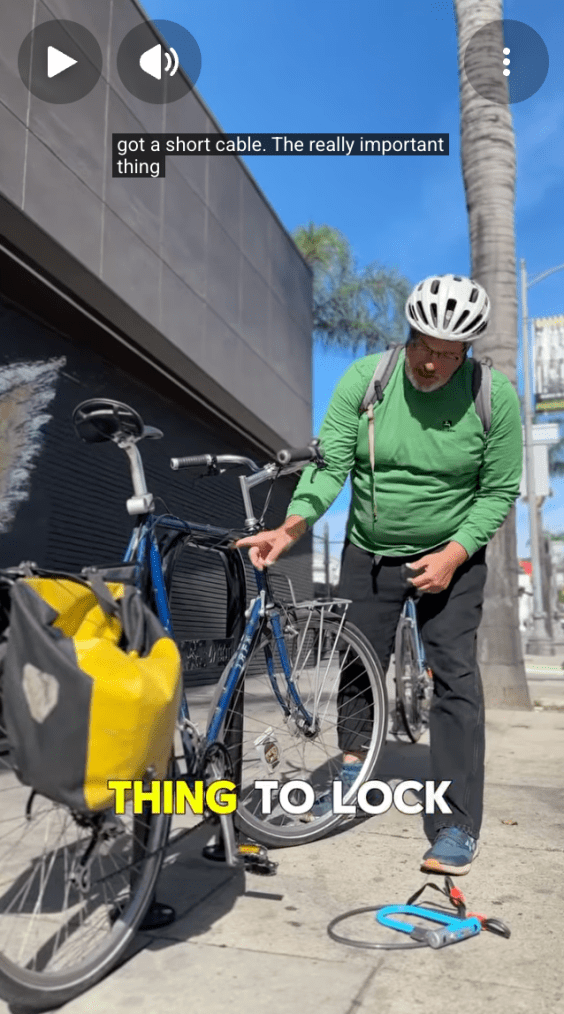San Franciscans have widely embraced events that close streets to cars and open them up to people, with Sunday Streets having expanded to 11 well-attended events per year, and possibly more to come. But for residents looking to hold car-free neighborhood events of their own, unaffordable city fees can present a major barrier.
Community organizers in the Inner Sunset, who are planning to hold four street fairs this year called Inner Sunset Sundays, have teamed up with Sunday Streets organizers to push city agencies to reduce costs and cut red tape to facilitate community street events.
Organizer Adam Greenfield said Inner Sunset Sundays is intended to build on the success of the Inner Sunset Street Fair, which was held each of the last two years. However, fees for this year's four events, which will take place on one block of Irving Street between 9th and 10th Avenues, will saddle organizers with an estimated bill of $25,000. The fees, he said, are not only questionable, but prevent organizers from holding bigger, more frequent events and force them to commercialize much of the space.
"The current system in San Francisco is destroying community -- it's that simple," said Greenfield. "It's harming people psychologically and physically, it's harming business, it's harming everybody. And I think it should be one of the city's core goals to help people who are building community."
"You don't have to pay a toll every time you get in your car and drive around," he said, "but for some reason when it comes to building community, which I think is as important as moving around, the city lumps excessive fees on you."
The fees for last year's Inner Sunset Street Fair, which occupied just three blocks during a Sunday afternoon, were $9,000. "Everyone we talk to about this," said Greenfield, "the universal reaction is shock. 'How can it cost that much?'"
Street events are managed by the Interdepartmental Staff Committee on Traffic and Transportation (ISCOTT), comprised of staff from the SF Municipal Transportation Agency, the Department of Public Works, the Police Department, the Fire Department, the Department of Public Health, and other agencies. The fees -- some of which organizers deem reasonable -- include paying city personnel to set up barricades and "No Parking" signs, parking control officers to direct cross traffic (if it exists), permits for food service and sound amplification, and other services like portable toilets.
However, for some of the fees, organizers say there seems to be little or no actual service provided. While some may be explained by the staff needed to review and process applications, others are more mysterious. For example, the Entertainment Commission requires a $440 permit to amplify sound -- the same fee charged for a large outdoor concert. "I have no idea where that money goes," said Greenfield. "They don't do anything for you. You just pay them the money, and you can amplify sound."
The Fire Department also charges a fee of $1,400 to allow up to four booths for reasons unclear, and Greenfield said organizers have no say in the number of police officers needed, who are each paid $65 per hour at the organizers' expense. The staffing number is determined independently by the local police station, and organizers expect to pay $7,000 for police alone at this year's four Inner Sunset Sundays events.
"There's not enough differentiation between a small community event and a street fair," said Susan King, who organizes Sunday Streets events for Livable City. King is helping Greenfield and others lead efforts with ISCOTT agencies to create a streamlined program within the next two years, which would reduce costs for simpler events, though negotiations are still nascent.
King, who continues to work on expanding Sunday Streets events while reducing staffing costs, wrote a list of changes agencies could make to lower the costs for smaller neighborhood events, including trimming the unnecessary staffing of police and parking control officers for tasks that volunteers or other staff could perform at much less expense.
In one of the first changes, the city recently stopped assigning police officers to post cardboard "No Parking" signs on parking meters prior to an event, instead giving the job to SFMTA staff. That's estimated to save the city well over $1 million over two years.
"The personnel costs are really the big thing," said King. "The policy changes that I'm suggesting around these kinds of expenses would be to have local police and fire services be aware and available to assist -- that's what our taxes pay for." She also said parking control officers shouldn't be assigned to stand at intersections where cross traffic isn't allowed, and that the number of intersections that do allow cross traffic should be minimized. (Inner Sunset Sundays will only take place on one block and have no such intersections.)
As a model program for community street events, Greenfield and King pointed to New York City's Play Streets, which they said asks residents to fill out a simple form and pay a small fee. San Franciscans can get a block party permit for $150, which allows up to two block parties, but the organizers can't invite people who don't live on the block, and Greenfield said he still feels the price is "ridiculous."
In addition to community donations, Inner Sunset Sundays organizers will be forced to help pay much of the fees by renting space to vendors, detracting from the open space feel that Sunday Streets events bring. "If you want a street event that's about building community, and not have a commercial element there, you can't do that," said Greenfield.
"A really big thing for us is actually using the block and making it feel like a plaza, and that's really important," he said, "because we've identified plazas as a really essential part of the city's infrastructure to build community, to keep people coming to local businesses, and people's psychological and material well-being are assisted by plazas."
At the Inner Sunset Street Fair last year, co-organizer Chris Duderstadt presented a vision for a permanent plaza on the block of Irving where Inner Sunset Sundays will take place. The response from neighbors was overwhelmingly positive, but rather than rally support for the vision, Greenfield said the main intent of Inner Sunset Sundays is to build community and generate discussion about how the street could work better for people rather than cars.
"We're at the beginning, I think, of an exciting new era where people are just starting to wake up to what happened with the arrival of the automobile into our society," he said, "and what it did in terms of crushing community and driving people out of the streets and into their homes."
The dates for Inner Sunset Sundays are set for September 9, October 14, November 11, December 9, on Irving Street between 9th and 10th Avenues.









